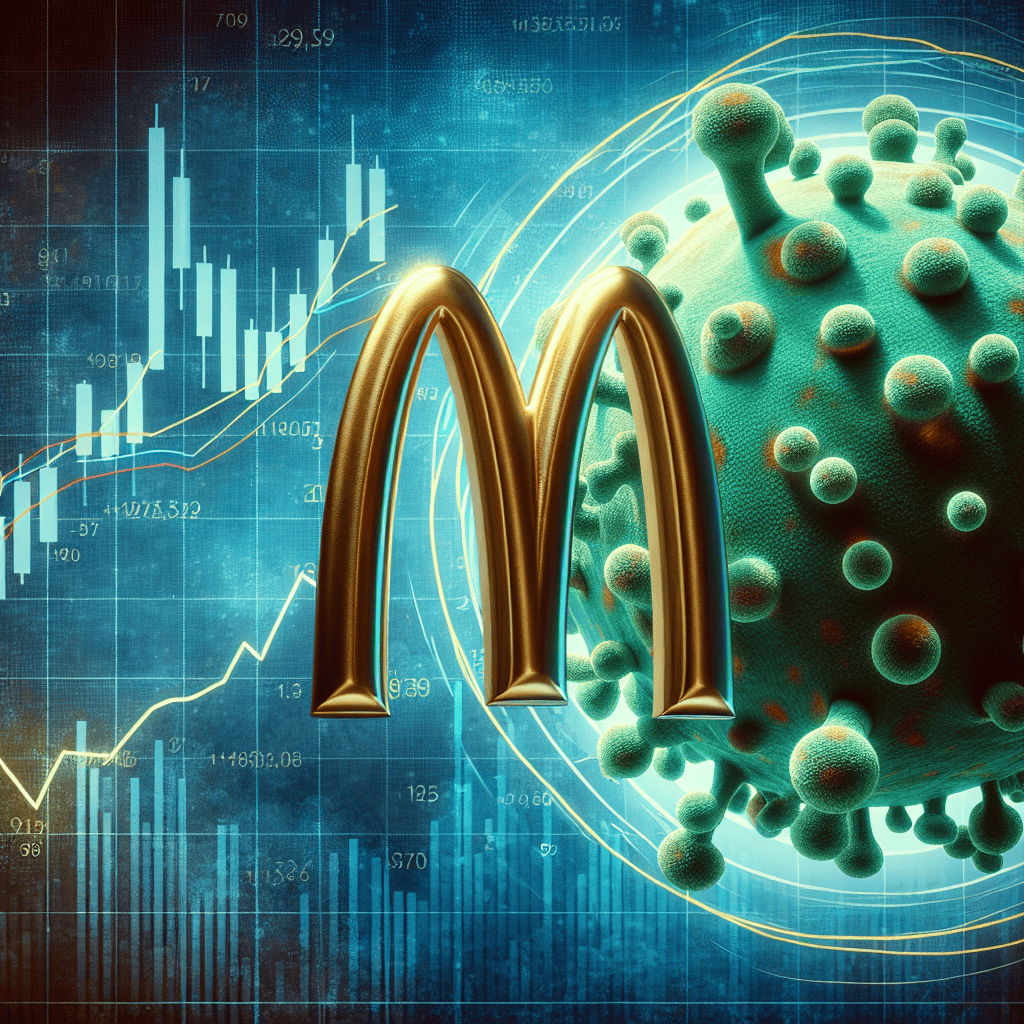“Invest in McDonald’s: Navigating Risks for Potential Rewards.”
Introduction
Investing in McDonald’s Amid E. coli Concerns: A Risk Worth Taking?
In the ever-evolving landscape of global fast-food giants, McDonald’s stands as a towering figure, renowned for its iconic golden arches and ubiquitous presence. However, like any major corporation, it is not immune to challenges that can impact its market performance and investor confidence. Recent concerns surrounding E. coli outbreaks linked to the food industry have cast a shadow over McDonald’s, prompting investors to weigh the potential risks and rewards of maintaining or initiating positions in the company’s stock. This situation presents a critical juncture for investors, as they must assess whether the current concerns are a temporary setback or a more profound threat to McDonald’s long-term growth and profitability. As we delve into the intricacies of this issue, we explore whether investing in McDonald’s amid these health concerns is a calculated risk worth taking or a gamble best avoided.
Understanding E. Coli: What It Means for McDonald’s Investors
Investing in McDonald’s, a global fast-food giant, has long been considered a stable choice for many investors. However, recent concerns surrounding E. coli outbreaks have raised questions about the potential risks associated with such investments. Understanding the implications of E. coli for McDonald’s investors requires a comprehensive examination of both the nature of the bacteria and the company’s response to such challenges.
E. coli, or Escherichia coli, is a bacterium commonly found in the intestines of humans and animals. While most strains are harmless, some can cause severe foodborne illnesses. Outbreaks linked to E. coli can lead to significant public health concerns, prompting scrutiny of food safety practices within the food industry. For a company like McDonald’s, which serves millions of customers daily, maintaining rigorous food safety standards is paramount. Any lapse can result in not only health risks but also reputational damage and financial losses.
In the context of McDonald’s, an E. coli outbreak can have multifaceted impacts. Firstly, there is the immediate concern of consumer safety. Ensuring that food products are free from contamination is crucial to maintaining customer trust. In the event of an outbreak, McDonald’s would need to act swiftly to identify the source, recall affected products, and implement corrective measures. This process can be costly and time-consuming, potentially affecting the company’s bottom line.
Moreover, the reputational impact of an E. coli outbreak cannot be underestimated. In today’s digital age, news spreads rapidly, and negative publicity can quickly erode consumer confidence. For investors, this translates into potential volatility in stock prices as market perceptions shift. The long-term effects on brand loyalty and customer retention are also considerations that investors must weigh.
However, it is important to recognize that McDonald’s has a robust framework in place to address food safety concerns. The company has invested heavily in supply chain management and quality control measures to minimize the risk of contamination. Additionally, McDonald’s has demonstrated a commitment to transparency and accountability, often working closely with health authorities to resolve issues promptly. These proactive measures can mitigate the adverse effects of an outbreak, reassuring both consumers and investors.
Furthermore, McDonald’s global presence and diversified menu offerings provide a buffer against localized incidents. While an E. coli outbreak in one region may impact sales temporarily, the company’s extensive network allows it to absorb such shocks more effectively than smaller competitors. This resilience is a key factor for investors to consider when evaluating the potential risks and rewards of investing in McDonald’s.
In conclusion, while E. coli concerns present a tangible risk for McDonald’s investors, the company’s established protocols and global reach offer significant mitigating factors. Investors must carefully assess the balance between these risks and the potential for long-term growth. By staying informed about McDonald’s food safety initiatives and market strategies, investors can make more informed decisions. Ultimately, the decision to invest in McDonald’s amid E. coli concerns hinges on one’s risk tolerance and confidence in the company’s ability to navigate such challenges.
Historical Impact of Health Scares on McDonald’s Stock
Investing in McDonald’s amid E. coli concerns presents a complex decision for potential investors, as historical health scares have had varied impacts on the company’s stock. To understand the potential risks and rewards, it is essential to examine how McDonald’s has navigated past health-related challenges and the subsequent effects on its financial performance. Historically, McDonald’s, as a global fast-food giant, has faced several health scares, including outbreaks of foodborne illnesses such as E. coli. These incidents often lead to immediate public concern and can result in temporary declines in customer traffic and sales. However, the company’s robust crisis management strategies and strong brand loyalty have typically enabled it to recover over time.
For instance, during the 1980s and 1990s, McDonald’s encountered multiple health-related issues, including concerns over food safety and nutritional content. Despite these challenges, the company demonstrated resilience by implementing rigorous safety protocols and launching marketing campaigns to reassure customers. As a result, while there were short-term fluctuations in stock prices, McDonald’s managed to maintain its market position and continue its growth trajectory. Similarly, in the early 2000s, the fast-food industry faced increased scrutiny over health and obesity concerns. McDonald’s responded by diversifying its menu to include healthier options, such as salads and fruit, and by providing more transparent nutritional information. These strategic adjustments not only mitigated the negative impact on its stock but also attracted a broader customer base, ultimately contributing to long-term financial stability.
Moreover, McDonald’s has consistently leveraged its global presence and operational efficiency to weather health-related storms. The company’s ability to adapt to local market conditions and consumer preferences has been a critical factor in maintaining its competitive edge. For example, during the 2014 food safety scandal in China, McDonald’s swiftly addressed the issue by enhancing supplier audits and reinforcing quality control measures. Although the incident initially affected sales in the region, the company’s proactive response helped restore consumer confidence and stabilize its stock performance.
In addition to its crisis management capabilities, McDonald’s benefits from a strong brand identity and customer loyalty, which have historically cushioned the impact of health scares on its stock. The company’s iconic status and widespread recognition often translate into a level of trust that can withstand temporary setbacks. This brand strength, coupled with a consistent focus on innovation and customer experience, has enabled McDonald’s to maintain its market leadership despite occasional challenges.
While investing in McDonald’s amid E. coli concerns involves inherent risks, the company’s track record suggests that it possesses the resilience and strategic acumen to navigate such challenges effectively. Potential investors should consider the historical context of health scares and the company’s ability to adapt and recover. Although short-term volatility in stock prices may occur, McDonald’s long-term growth prospects remain promising, supported by its global reach, operational efficiency, and commitment to quality.
In conclusion, while health scares like E. coli outbreaks can pose significant challenges for McDonald’s, the company’s historical resilience and strategic responses have often mitigated the long-term impact on its stock. Investors must weigh the potential risks against the company’s proven ability to adapt and thrive in the face of adversity. As such, investing in McDonald’s amid current health concerns may indeed be a risk worth taking, given its strong foundation and capacity for recovery.
Risk Assessment: Investing in McDonald’s During Health Crises
Investing in McDonald’s, a global fast-food giant, has long been considered a stable choice for many investors. However, the emergence of health crises, such as E. coli outbreaks, can pose significant challenges to the company’s reputation and financial performance. As potential investors weigh the risks and rewards, it is crucial to assess whether investing in McDonald’s during such times is a prudent decision.
To begin with, McDonald’s has a robust history of navigating through various challenges, including health-related issues. The company’s extensive experience in crisis management and its commitment to food safety are pivotal factors that can mitigate the impact of E. coli concerns. McDonald’s has implemented stringent safety protocols and collaborates with health authorities to ensure that its food supply chain adheres to the highest standards. This proactive approach not only helps in addressing immediate concerns but also reinforces consumer confidence in the brand.
Moreover, McDonald’s possesses a strong brand equity that often acts as a buffer during crises. The company’s global presence and diversified menu offerings enable it to maintain a steady stream of revenue, even when certain markets face temporary setbacks. This resilience is further bolstered by McDonald’s strategic initiatives, such as digital transformation and menu innovation, which continue to attract a broad customer base. Consequently, while an E. coli outbreak may cause short-term fluctuations in stock prices, the long-term growth prospects of McDonald’s remain promising.
In addition to its crisis management capabilities, McDonald’s financial health is another critical aspect to consider. The company boasts a solid balance sheet, with substantial cash reserves and a consistent track record of dividend payments. This financial stability provides McDonald’s with the flexibility to invest in safety measures, marketing campaigns, and other initiatives that can help restore consumer trust. Furthermore, the company’s ability to generate significant cash flow allows it to weather economic downturns and health crises more effectively than many of its competitors.
However, it is essential to acknowledge the potential risks associated with investing in McDonald’s during an E. coli outbreak. Negative publicity can lead to a decline in customer traffic, impacting sales and profitability. Additionally, the costs associated with addressing the outbreak, such as legal fees and compensation claims, can strain the company’s financial resources. Investors must also consider the possibility of regulatory actions, which could impose further operational constraints on McDonald’s.
Despite these challenges, the fast-food industry has historically demonstrated resilience in the face of health crises. Consumer demand for convenient and affordable dining options remains strong, and McDonald’s is well-positioned to capitalize on this trend. The company’s ability to adapt to changing consumer preferences, coupled with its focus on sustainability and corporate responsibility, enhances its appeal to socially conscious investors.
In conclusion, while investing in McDonald’s amid E. coli concerns involves certain risks, the company’s strong brand, financial stability, and crisis management expertise make it a potentially rewarding opportunity. Investors should carefully evaluate their risk tolerance and investment objectives, considering both the short-term uncertainties and the long-term growth potential of McDonald’s. By doing so, they can make informed decisions that align with their financial goals, even in the face of health-related challenges.
Long-term vs. Short-term: McDonald’s Investment Strategies Amid E. Coli Concerns

Investing in McDonald’s, a global fast-food giant, has long been considered a stable choice for both short-term and long-term investors. However, recent concerns surrounding E. coli outbreaks have raised questions about the potential risks and rewards associated with such an investment. As investors weigh their options, it is crucial to consider both the immediate implications and the broader, long-term strategies that McDonald’s may employ to navigate these challenges.
In the short term, the impact of E. coli concerns on McDonald’s stock can be significant. Negative publicity and consumer apprehension can lead to a decline in sales, which in turn may affect the company’s quarterly earnings. This immediate reaction can cause fluctuations in stock prices, presenting a potential risk for short-term investors who are sensitive to market volatility. However, it is important to note that McDonald’s has a history of effectively managing crises and implementing measures to restore consumer confidence. By swiftly addressing food safety concerns and enhancing transparency, the company can mitigate the immediate impact on its financial performance.
Transitioning to a long-term perspective, McDonald’s has consistently demonstrated resilience and adaptability in the face of challenges. The company’s robust global supply chain and commitment to quality assurance provide a strong foundation for addressing food safety issues. Moreover, McDonald’s has invested heavily in technology and innovation to improve operational efficiency and customer experience. These strategic initiatives not only enhance the company’s ability to manage current concerns but also position it for sustained growth in the future.
Furthermore, McDonald’s brand strength and market presence offer a significant advantage in weathering temporary setbacks. The company’s extensive network of restaurants and loyal customer base provide a buffer against short-term disruptions. Additionally, McDonald’s has a proven track record of successfully navigating public relations challenges, which can help maintain its reputation and consumer trust over time. This resilience is a key factor for long-term investors who prioritize stability and consistent returns.
Moreover, the fast-food industry as a whole is evolving, with increasing emphasis on health and sustainability. McDonald’s has been proactive in adapting to these trends by introducing healthier menu options and committing to sustainable sourcing practices. These efforts not only align with changing consumer preferences but also demonstrate the company’s commitment to long-term growth and sustainability. By investing in McDonald’s, long-term investors can benefit from the company’s ability to adapt to industry shifts and capitalize on emerging opportunities.
In conclusion, while E. coli concerns present a short-term risk for McDonald’s investors, the company’s strong fundamentals and strategic initiatives offer a compelling case for long-term investment. By effectively managing food safety issues and leveraging its brand strength, McDonald’s can navigate current challenges and continue to deliver value to its shareholders. For investors considering McDonald’s as part of their portfolio, it is essential to balance the potential short-term volatility with the company’s proven ability to adapt and thrive in the long run. Ultimately, investing in McDonald’s amid E. coli concerns may indeed be a risk worth taking, particularly for those with a long-term investment horizon.
Consumer Confidence and Its Effect on McDonald’s Market Performance
In recent times, McDonald’s, a global leader in the fast-food industry, has faced significant scrutiny due to concerns over E. coli outbreaks linked to its supply chain. This situation has inevitably raised questions about consumer confidence and its subsequent impact on the company’s market performance. As investors weigh the potential risks and rewards of investing in McDonald’s, it is crucial to understand the dynamics of consumer confidence and how it influences the company’s financial health.
Consumer confidence is a critical factor in determining the success of any business, particularly in the fast-food sector, where brand trust and loyalty play pivotal roles. When consumers perceive a brand as safe and reliable, they are more likely to continue patronizing it, even in the face of negative news. However, when health concerns such as E. coli outbreaks arise, consumer confidence can be severely shaken, leading to a decline in sales and, consequently, a dip in market performance. This is particularly true for McDonald’s, which relies heavily on its reputation for quality and safety to maintain its customer base.
Despite these challenges, McDonald’s has historically demonstrated resilience in the face of adversity. The company has implemented rigorous safety protocols and transparency measures to reassure consumers and restore confidence. By addressing the root causes of the E. coli concerns and taking proactive steps to prevent future incidents, McDonald’s aims to mitigate the impact on its brand image and financial performance. This commitment to safety and quality is a crucial factor that investors must consider when evaluating the potential risks and rewards of investing in the company.
Moreover, McDonald’s has a robust global presence and a diversified product portfolio, which can help cushion the impact of localized issues. The company’s ability to adapt to changing consumer preferences and market conditions has been a key driver of its long-term success. For instance, McDonald’s has been expanding its menu to include healthier options and investing in technology to enhance the customer experience. These strategic initiatives not only help to attract a broader customer base but also demonstrate the company’s commitment to innovation and growth.
In addition to these internal strategies, external market conditions also play a significant role in shaping McDonald’s market performance. The fast-food industry is highly competitive, with numerous players vying for market share. However, McDonald’s strong brand recognition and extensive global footprint provide it with a competitive edge. Furthermore, the company’s ability to leverage economies of scale allows it to maintain cost efficiencies, which can be particularly advantageous during periods of economic uncertainty.
While the E. coli concerns present a potential risk, they also offer an opportunity for McDonald’s to reinforce its commitment to safety and quality, thereby strengthening consumer trust in the long run. For investors, this situation presents a complex decision-making scenario. On one hand, the immediate impact of the E. coli concerns may lead to short-term volatility in McDonald’s stock price. On the other hand, the company’s proactive measures and strategic initiatives could enhance its long-term growth prospects.
In conclusion, investing in McDonald’s amid E. coli concerns requires a careful assessment of both the risks and potential rewards. By understanding the interplay between consumer confidence and market performance, investors can make informed decisions about whether this iconic fast-food giant represents a risk worth taking. As McDonald’s continues to navigate these challenges, its ability to maintain consumer trust and adapt to evolving market conditions will be crucial determinants of its future success.
Diversification: Balancing McDonald’s Stock in Your Investment Portfolio
Investing in McDonald’s amid E. coli concerns presents a unique challenge for investors seeking to balance their portfolios. As one of the world’s largest fast-food chains, McDonald’s has long been a staple in many investment portfolios due to its robust business model and global presence. However, recent E. coli outbreaks linked to some of its locations have raised questions about the potential risks associated with holding McDonald’s stock. In light of these concerns, it is crucial for investors to consider the role of diversification in mitigating risk while maintaining exposure to the potential rewards that McDonald’s stock can offer.
To begin with, diversification is a fundamental principle in investment strategy, aimed at reducing risk by spreading investments across various asset classes, sectors, and geographies. By holding a diversified portfolio, investors can protect themselves against the volatility and uncertainties that may affect individual stocks or sectors. In the case of McDonald’s, the E. coli concerns highlight the importance of not putting all one’s eggs in a single basket. While McDonald’s has a strong track record of performance, the potential impact of food safety issues on its reputation and financial results cannot be ignored.
Moreover, the fast-food industry is inherently susceptible to health-related risks, which can lead to significant fluctuations in stock prices. Therefore, investors should consider balancing their exposure to McDonald’s with investments in other sectors that are less vulnerable to such risks. For instance, incorporating stocks from industries like technology, healthcare, or utilities can provide a buffer against the potential downside of holding McDonald’s stock. This approach not only helps in managing risk but also allows investors to capitalize on growth opportunities in other sectors.
In addition to sector diversification, geographic diversification can also play a crucial role in balancing McDonald’s stock within an investment portfolio. McDonald’s operates in over 100 countries, and its performance can be influenced by various factors, including economic conditions, regulatory changes, and consumer preferences in different regions. By investing in companies with a strong presence in diverse geographic markets, investors can reduce their reliance on McDonald’s and mitigate the impact of regional challenges that may affect its operations.
Furthermore, it is essential for investors to stay informed about McDonald’s efforts to address the E. coli concerns and enhance its food safety measures. The company’s response to these issues can significantly influence investor confidence and, consequently, its stock performance. By closely monitoring McDonald’s initiatives to improve food safety and customer trust, investors can make informed decisions about the appropriate level of exposure to the stock within their portfolios.
In conclusion, while investing in McDonald’s amid E. coli concerns presents certain risks, these can be effectively managed through diversification. By balancing McDonald’s stock with investments in other sectors and geographies, investors can protect their portfolios from potential volatility while still benefiting from the company’s long-term growth prospects. Ultimately, a well-diversified portfolio not only mitigates risk but also positions investors to take advantage of opportunities across different markets, ensuring a more stable and rewarding investment journey.
Analyzing McDonald’s Crisis Management and Its Influence on Investor Decisions
Investing in McDonald’s amid E. coli concerns presents a complex decision for investors, as it intertwines the potential risks associated with food safety issues and the company’s crisis management capabilities. McDonald’s, a global fast-food giant, has faced various challenges over the years, but its ability to navigate crises has often been a testament to its robust management strategies. The recent E. coli concerns have once again put the spotlight on the company’s crisis management skills, prompting investors to evaluate whether these issues significantly impact the long-term value of their investments.
To begin with, it is essential to understand the nature of the E. coli concerns and their potential impact on McDonald’s operations. E. coli outbreaks can lead to severe health implications for consumers, resulting in a loss of trust and a decline in customer footfall. This, in turn, can affect the company’s revenue and profitability. However, McDonald’s has historically demonstrated resilience in the face of such challenges, often emerging stronger by implementing stringent safety measures and transparent communication strategies. This ability to adapt and respond effectively is a critical factor for investors to consider when assessing the potential risks associated with the current situation.
Moreover, McDonald’s crisis management approach plays a pivotal role in shaping investor decisions. The company has consistently prioritized food safety and quality, investing in advanced technologies and rigorous supply chain protocols to mitigate risks. In response to E. coli concerns, McDonald’s has swiftly initiated comprehensive investigations and collaborated with health authorities to ensure consumer safety. Such proactive measures not only help in containing the immediate crisis but also reinforce the brand’s commitment to maintaining high standards. For investors, this demonstrates a level of preparedness and responsibility that can mitigate potential financial repercussions.
Furthermore, the influence of McDonald’s crisis management on investor decisions extends beyond immediate financial considerations. The company’s ability to maintain its brand reputation during crises is crucial for long-term investor confidence. McDonald’s has cultivated a strong brand image over decades, characterized by consistency, reliability, and customer loyalty. Effective crisis management ensures that these brand attributes remain intact, thereby preserving the company’s market position and competitive advantage. Investors are likely to view this as a positive indicator of McDonald’s capacity to weather challenges and sustain growth.
In addition to crisis management, investors must also consider the broader market dynamics and consumer trends that influence McDonald’s performance. The fast-food industry is highly competitive, with evolving consumer preferences and increasing demand for healthier options. McDonald’s has been proactive in adapting to these trends, diversifying its menu offerings and enhancing its digital capabilities to cater to changing consumer needs. This adaptability, coupled with effective crisis management, positions McDonald’s as a resilient player in the industry, capable of navigating both internal and external challenges.
In conclusion, investing in McDonald’s amid E. coli concerns requires a nuanced understanding of the company’s crisis management strategies and their impact on investor decisions. While the potential risks associated with food safety issues cannot be overlooked, McDonald’s track record of effective crisis response and brand resilience offers reassurance to investors. By maintaining a focus on food safety, transparency, and adaptability, McDonald’s continues to demonstrate its commitment to safeguarding consumer trust and sustaining long-term growth. Consequently, for investors willing to navigate the complexities of the fast-food industry, McDonald’s presents a risk worth considering, backed by its robust crisis management framework and enduring brand strength.
Q&A
1. **What is the current impact of E. coli concerns on McDonald’s stock price?**
The stock price may experience short-term volatility due to negative news, but the long-term impact depends on the company’s response and consumer confidence.
2. **How has McDonald’s historically handled food safety issues?**
McDonald’s has a track record of addressing food safety concerns through transparent communication, implementing stricter safety protocols, and working with suppliers to ensure quality.
3. **What are the potential risks of investing in McDonald’s during an E. coli outbreak?**
Risks include potential legal liabilities, loss of consumer trust, decreased sales, and increased operational costs to address the issue.
4. **What are the potential benefits of investing in McDonald’s despite E. coli concerns?**
Benefits include the company’s strong brand, global presence, and ability to recover from past crises, which may present a buying opportunity if the stock is undervalued.
5. **How does McDonald’s financial health support its ability to manage a crisis?**
McDonald’s typically has a strong balance sheet, significant cash reserves, and robust cash flow, enabling it to manage crises effectively.
6. **What role does consumer perception play in McDonald’s recovery from E. coli concerns?**
Consumer perception is crucial; effective crisis management and communication can help restore trust and drive a quicker recovery.
7. **Is investing in McDonald’s amid E. coli concerns a risk worth taking?**
It depends on the investor’s risk tolerance, belief in McDonald’s ability to manage the crisis, and long-term investment strategy.
Conclusion
Investing in McDonald’s amid E. coli concerns presents a nuanced risk-reward scenario. Historically, McDonald’s has demonstrated resilience in the face of food safety issues, leveraging its robust supply chain management and crisis response strategies to mitigate long-term impacts. The company’s strong brand equity, global presence, and consistent financial performance provide a solid foundation for recovery and growth. However, potential investors must weigh the immediate reputational and financial risks associated with E. coli outbreaks, including potential declines in consumer confidence and increased regulatory scrutiny. Ultimately, while the risk is notable, McDonald’s track record and strategic initiatives may offer a compelling case for investment, contingent on the company’s ability to swiftly and effectively address the concerns.





